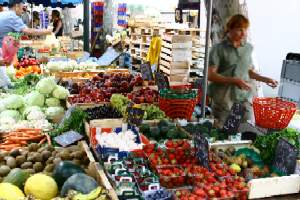Going to the Lezignan Corbieres market for the past three years has got me musing about the changing nature of markets and town centres.
Public markets and town centres have taken a huge hit over the past 50 years. It all really started with the spread of that beastlie energy gobler- the domestic fridge. Perishable and fragile foods no longer had to be bought on a daily basis. A weekly shop could be kept in good condition in the home. Profiting on the spread of the fridge the idea of a single stop shop for all the home’s needs came into it’s own, the super market was born. As it is difficult to carry a week’s shopping, parking, not often found in plenty in town centres, became a necessity. So the supermarkets moved out of town centres onto the ring roads where land was cheap and access by car easier.
Markets struggled on while the town centres in which they were traditionally held slowly died. Local shops slowly close down, unable to compete with the single mass buying power of the large supermarket chains. The character of town centres and indeed town life changed.
The change is not just economic but social as well. Thriving town centres and their markets play an important part in fixing the social glue that hold communities together. It is not just about talking to producers and resellers who understand their wares and produce.Markets are also meeting points to catch up with friends and neighbours. A brief hello over a charged trolly in Tesco’s is not the same as a good gossip over a cup of java or pint in a local tea shop or pub. Not that there are many tea shops left, just loads of franchised coffee chains.
The empty town centres of traditional market towns are sad reflections of the shift in consumer patterns. Thirsk town centre where I grew up is a ghost of its former self, the hand full of shops and market stand holders is a sad memory of the bustling chaos that was my happy youthful memories.
I was reminded of the changes I have seen in Thirsk a couple of weeks ago in Lezignan Corbieres market. I arrived as usual at 6.30am to find my spot covered in blood, apparently there had been an altercation between a group of lads and a kid. The kid ended up the worse for the encounter, upon finding out what happened to his son the father, I was told, came into town and stabbed three of the group. Lezignan Corbieres, when we arrived in 1999, had one friendly shabby old Champion and a badly run, dirty Intermarche. We now had a Lidl, Aldi, Dea, Netto three new ring road shopping centres and a virtually dead town centre. More and more of the local businesses are closing up, some taking space in the commercial centres but increasingly just giving up as sons and daughters have no wish to take over. Revenues have dropped off to such a low level that the business is no longer sustainable. Evenings are apparently a tad hazardous at times, while official business is on the decline unofficial tobacco sales and heavier drugs are becoming more open and bring with them the associated turf disputes.
Some of my more elderly clients tell me they leave the house rarely, to visit the doctor (Nothing bar a nuclear war, or rain, will stop the French confirming their deeply held belief that a painful and unusual illness is just around the corner) and to come down for the market. On Wednesday’s market day they can combine buying their veg with discussing with friends in minute detail their latest terrible symptoms and show off the small haversack of various medicines the Doctor has prescribed in perfect security. We stand holders have a vested interest in a safe market place.
The irony is of course is that while the town centre is slowly decaying the town itself is rapidly expanding. As well as the new commercial zones, an extension of the college, the new lycee, the building of a new media centre, the walled bungalow lotissements are reaching out into the vines at an amazing rate. When we arrived back in 1999 Lezignan Corbiere had 8, 266 residents, by 2012 they had swollen to 10,866 according to Lezignan Corberes Wikipedia page so I reckon they will have passed the 12,000 mark and be racing towards the 13,000 record in the near future
The political response has been muted, the new Socialist/Communist administration, as well as holding off a resurgent Front Nationale, were elected on a programme of town regeneration. They have got it half right, the new lycee being built will help a little, the plans to re furnish some of the centre will have some benefits if they are properly instituted. One great initiative was the launch of the Lezignan Corbieres local producers market on Saturday. Wednesday’s market will remain the largest but it is great to see some support for local farmers and an acknowledgement that producing and re selling are different activities. The former creates local sustainability, employment and keep money local; the latter exports money to distant suppliers and does little to create a vibrant local economy.
Right rant over time to sort the plants out for the market in Lezignan Corbieres tomorrow
More intelligent people than me at the new economics foundation have done a lot of work on revitalising local economies- Clone Town Britain is definitely worth a read.

